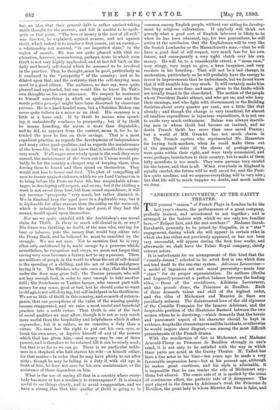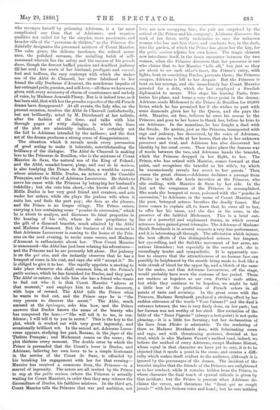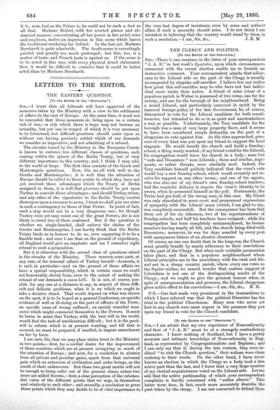"ADRIENNE LECOUVBEUR," AT THE GAIETY THEATRE.
THE present " season" of French Plays in London lacks the last year's charm, the performances of a great company, perfectly trained, and accustomed to act together ; and is arranged in the fashion with which we are only too familiar here,—" Eclipse first, and the rest nowhere !" Madame Sarah- Bernhardt, presently to be joined by Coquelin, in a " star " engagement, during which she will appear in certain thles in which she has either not previously appeared, or has not been very successful, will appear during the first four weeks, and afterwards we shall have the Palais Royal company, chiefly veteran actors.
It is unfortunate for an arrangement of this kind that the "comedy-drama" selected to be acted first is one which does not lend itself to the one-star system. Adrienne Lecouvreur- a model of ingenious art and moral perversity—needs four " stars " for its proper representation. Its authors (Scribe and Legouv6) preserved a perfect balance between the leading roles, — those of the comedienne, Adrienne Lecouvreur, and the grande dame, the Princesse de Bouillon. Each of these demands talent and skill of the highest order, and the roles of Michounet and Maurice de Saxe are peculiarly arduous. The disinterested love of the old regisseur of the Comedie Francaise for the famous Adrienne, and the despicable position of the illustrious Bastard between the two women whom he is deceiving,—which demands that the heroic and passionate aspect of his character should be kept in evidence, despite the circumstances andthe incidents, or otherwise he would inspire sheer disgust, —are among the most difficult presentments of the French drama.
With the recollection of Got as Ifichonnet and Madame Arnould-Plessy as Princesse de Bouillon strongly in one's mind, it is not easy to be satisfied with the way in which these parts are acted at the Gaiety Theatre. M. Talbot has been a fine actor in his time—ten years ago he made a very favourable impression here—but at his present age, although he makes great exertions, and his style is admirable, it is impossible that he can render the rOle of Michonnet any- thing but absurd. The comic side of it is spoiled by the sense of continuous effort, the pathetic side of it disappears. The part played in the drama by Adrienne's rival, the Princesse de Bouillon, the great lady to whom Maurice de Saxe is false, and.
who revenges herself by poisoning Adrienne, is a far more complicated one than that of Adrienne ; and requires qualities not called for by the simpler, more passionate, and broader rele of the " personne de theatre," as the Princess dis- dainfully designates the presumed mistress of Count Maurice. The calm grace, the delicate insolence, the refined assur- ance, the polished sarcasm, the unfailing habit of self- command wherein lies the safety and the success of his grande dame, though the fiercest baffled passion and deadliest jealousy fill her soul ; her scorn of her husband, profligate and savant, fool and buffoon, the easy contempt with which she makes use of the Abbe de Chazeuil, her utter falsehood to her friend the silly Duchesse d'Aumont, the murderous impulse of her outraged pride, passion, and self-love,—all these we have seen, given with every accessory of charm of countenance and melody of voice, by Madame Arnould-Plessy. But is it indeed true, as it has been said, that with her the grandes coquettes of the old French drama have disappeared At all events, the lady who, on the present occasion, receives the Abbe de Chazeuil (satisfactorily, but not brilliantly, acted by M. Dieudonne) at her toilette, after the fashion of the time, and talks with him through pages of witty dialogue, in which the lines of the plot are admirably indicated, is certainly not the foil to Adrienne intended by the authors ; and the first act of the drama produces a strong sense of disappointment.
The situation which it reveals needs every persuasion of good acting to make it tolerable, notwithstanding the brilliancy of the dialogue. The Abbe de Chazeuil is making love to the Princesse de Bouillon, who is the mistress of Count Maurice de Saxe, the natural son of the Bing of Poland ; and the Abbe, scandal-bearer, pimp, and ami de la maison, is also toadying the Prince de Bouillon, a would-be savant, whose mistress is Mdlle. Dudes, an actress of the Comedie Francaise, and the rival of Adrienne Lecouvreur. He thinks to serve his cause with the Princess by betraying her husband's infidelity; but she cuts him short,—she knows all about it, Mdlle. Ducks is her very good friend and creature, and acts under her orders, while she plays the jealous wife when it suits her, and finds the part pay; she does as she pleases, and the Prince is no longer stingy. The Prince enters, carrying a box containing some " poudre de succession," which he is about to analyse, and discusses its fatal properties in the hearing of his wife, whom he also propitiates by the gift of a diamond bracelet, much admired by the Abbe and Madame d'Aumont. But the business of the moment is that Adrienne Lecouvreur is coming to the house of the Prin- cess on the next evening, to recite some verses, and Madame d'Aumont is enthusiastic about her. Then Count Maurice is announced—the Abbe has just been relating his adventures— and the Princess and he are presently left alone. Her jealousy is on the qui viva, and she instantly observes that he has a bouquet of roses in his coat, and says she will "accept it." He is obliged to give it to her. She rapidly appoints a meeting to take place whenever she shall summon him, at the Prince's petite maison, which he has furnished for Duclos, and they part. The Abbe re-enters ; she tells him she has a friend who wants to find out who it is that Count Maurice "adores at that moment," and employs him to make the discovery, with hope of reward. The Abbe tells the Prince what he wants to find out, and the Prince says he is "the very person to discover the secret." The Abbe, ranch amused at the iqttivoque, asks him how, and the Prince answers that Duclos knows the name of the beauty who has conquered the hero :—" She will tell it to me, in con- fidence; I will tell it to you in secret." This is the key to the plot, which is worked out with very great ingenuity, and occasionally brilliant wit. In the second act, Adrienne Lecou- vreur appears, studying her part, Roxane, in the foyer of the Theatre Francais; and Michonnet comes on the scene ; the plot thickens every moment. The double error by which the Prince is persuaded that the Count's lover is Duclos, and Adrienne, believing her own lover to be a simple lieutenant in the service of the Count de Saxe, is offended by his breaking his engagement with her for that evening— Maurice has received a summons from, the Princess—is a marvel of ingenuity. The actors are all invited by the Prince to sup at the petite maison (where the Princess is actually waiting for Count Maurice), in order that they may witness the discomfiture of Dudes, his faithless mistress. In the third act, Count Maurice tells the Princess that war and ambition, not love, are now occupying him ; the pair are surprised by the arrival of the Prince and his company ; Adrienne discovers the rank of her lover, nobly undertakes to save the unknown woman who has met him there, and conducts her, in the dark, into the garden, of which the Prince has given her the key, for the petite maison adjoins her own house. The tragic element now introduces itself, in the fierce encounter between the two women, when the Princess discovers that her preserver is one who claims that to her Maurice "tells all," but just as they are about to see each other's faces, the Prince's entry, with lights, bent on convicting Duclos, prevents them ; the Princess escapes, Adrienne is left to her despair. But the Princess is bent on her revenge, and she immediately has Count Maurice arrested for a debt, which she has employed a Swedish diplomatist to secure. This stops his leaving Paris, frus- trates his plans, and forms a very clever point in the drama. Adrienne sends Michonnet to the Prince de Bouillon for 60,000 livres, which he has promised her if she wishes to part with some diamonds given her by the Queen, and she pays the debt. Maurice, set free, believes he owes his rescue to the Princess, and goes to her house to thank her, before he tries to see Adrienne. In the meantime, he has fought a duel with the Swede. He arrives, just as the Princess, transported with rage and jealousy, has discovered, by the voice of Adrienne, who has come to recite at her house, that she is her unknown preserver and rival, and Adrienne has also discovered her identity by her cruel scorn. Then takes place the famous war of words between the two, and Adrienne hands the bracelet, which the Princess dropped in her flight, to her. The Prince, who has retired with Maurice, comes forward at that point, and recognises the bracelet as his wife's, by which he unconsciously reveals her secret to her guests." Then comes the great climax,—Adrienne declaims a passage from Phare in which she hurls invective at the Princess, who sits smiling, with Maurice de Saxe by her side. In the last act the vengeance of the Princess is accomplished. She sends the bouquet of roses, poisoned with the " pondre de succession," to Adrienne, in the name of Count Maurice, and the poor, betrayed actress breathes the deadly fumes. Her lover comes to explain all, to learn that he owes all to her, to offer her his name, and she dies in his arms, in the presence of the faithful Michonnet. This is a brief out- line of a powerful and unpleasant drama, in which several actresses have gained great triumphs. The Adrienne of Madame Sarah Bernhardt is in several respects a very fine performance, and it is interesting all through. The affectation which injures the best effects of this distinguished actress, her languor, her eye-rolling, and the flail-like movement of her arms, are serious blemishes ; but especially in the second act, she is exceedingly tender and sympathetic. It is apparently use- less to observe that the attractiveness of no human face can possibly be heightened by the mouth being made to look like a wide streak of blood for the upper lip, and a blotch of the same for the under, and that Adrienne Lecouvreur, off the stage, would probably have worn the costume of her period. These are matters EN hopeless as our own Portia's male attire, but while they continue to be hopeless, we might be told a little less of the perfection of French actors in all points of taste and accuracy. In the great scene with the Princess, Madame Bernhardt produced a striking effect by her sudden utterance of the words " Vous l'aimez ?" and the duel ontrance between the two is very finely done, on her part; but her foeman was not worthy of her steel. Her recitation of the fable of the " Deux Pigeons" (always a test-point) is not quite pleasing,—it is a little too fawning ; but her declamation of the lines from Pliedre is admirable. To the rendering of them as Madame Bernhardt does, with fulminating scorn and rage, and with threatening gestures, directed at her rival, which is also Madame Favart's method (and, indeed, we believe the method of every Adrienne, except Madame Ristori, whose equal in that character we have yet to see), it is to be objected that it spoils a point in the scene, and creates a diffi- culty which makes itself evident to the audience, although it is ignored by the personages of the drama. The incident of the bracelet implies that the friends of the Princess are enlightened as to her conduct, while it remains hidden from the Prince, to whose character the final touch of cynical ridicule is given by that incident ; but the Prince is present when Adrienne de- claims the verses, and threatens the "front qui ne rougit jarnais !" with her furious voice and hand ; but he sees nothing
it it; now, fool as the Prince is, he could not be such a fool as all that. Madame Ristori, with her averted glance and ab- stracted manner, concentrating all her power in her awful voice and emphasis, makes an impression in this scene which leaves the traditional rendering far behind. In the last act, Madame Bernhardt is quite admirable. The death-scene is exceedingly painful, and greatly too much prolonged ; but this, too, is a matter of taste, and French taste is against us. If the scene is to be acted in this way, with every physical detail elaborated, then it would be difficult to conceive that it could be better acted than by Madame Bernhardt.




































 Previous page
Previous page